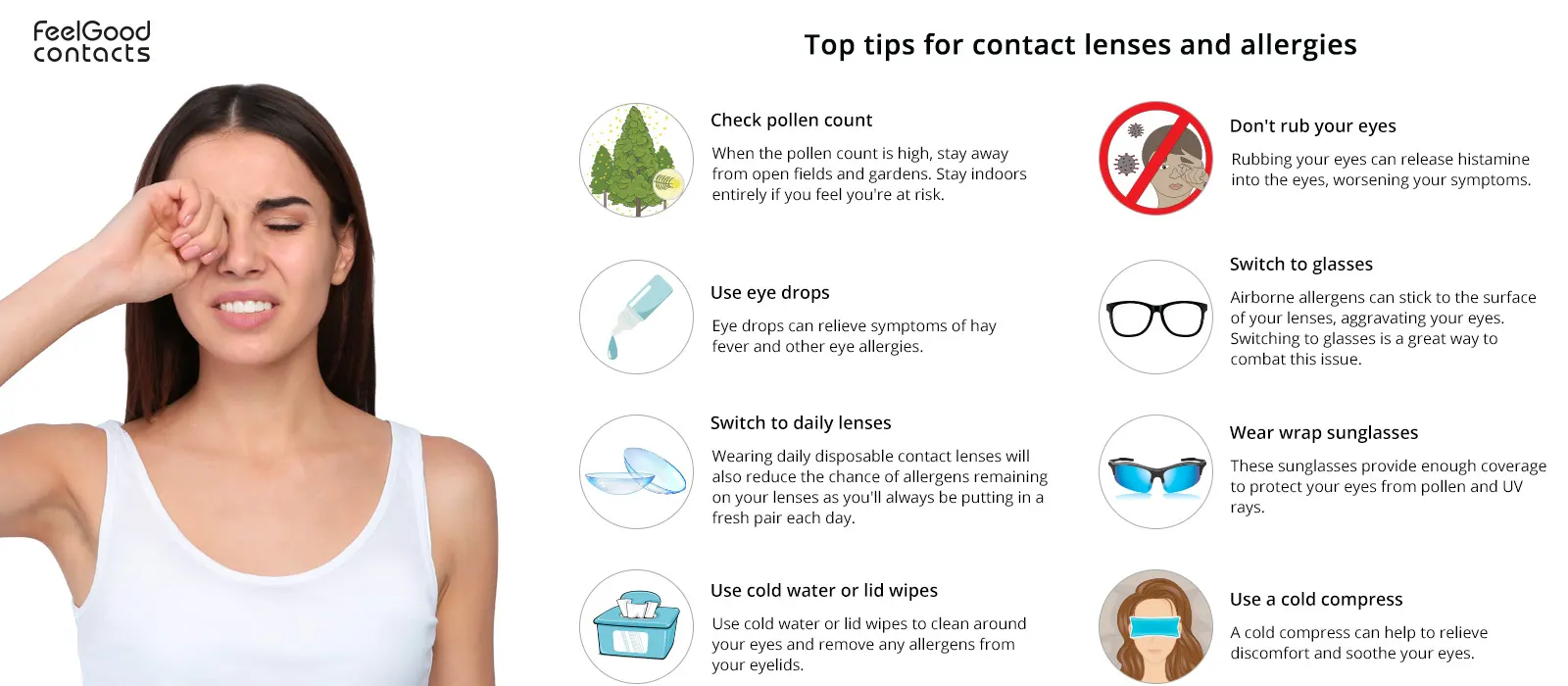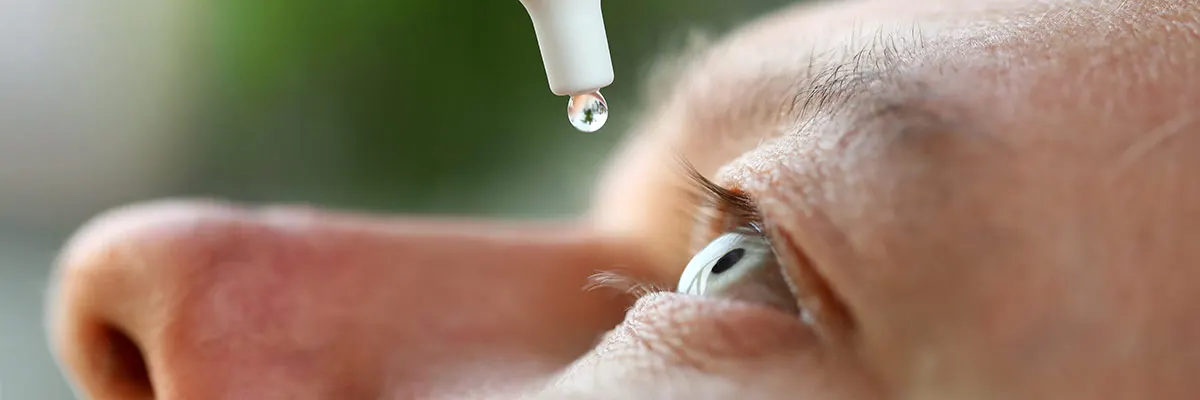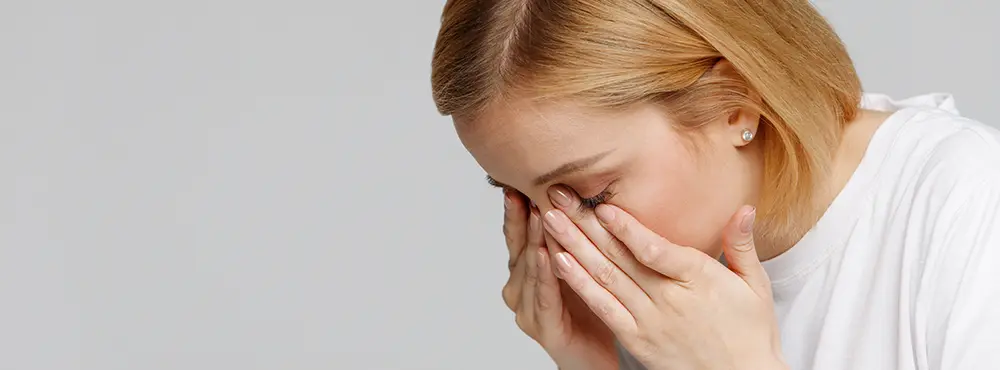If you wear contact lenses and also suffer from allergies, you may find it incredibly difficult to cope during hay fever season.
You may experience a host of uncomfortable symptoms, including dry eyes, redness, itchy eyes, puffiness and more. This can be enough to put you off wearing contact lenses full stop. Fear not however, this article will take you through our top tips for contact lenses and allergies.
Can allergies make it hard to wear contacts?
Allergies are no fun for anyone. They are especially hard for contact lens wearers. Contact lens wearers are prone to discomfort during certain times of the year. This is because allergens in the air stick to the surface of contact lenses and cause irritated eyes.
Allergy symptoms include itching, swelling, redness and watering.
You can limit your exposure to allergens and keep your eyes safe during allergy season by following our top tips:

- Always check the pollen count in your local area in the morning. This way, you'll know of any risks and what to expect.
At times when the pollen count is high, it's best to stay away from open fields and gardens. Stay indoors entirely if you feel you're at risk.
If you're aware of the pollen forecast, you can work out which pollen affects you the most and avoid it. Pollen season can be split into 3 phases:
- Tree pollen: late March to mid-May
- Grass pollen: mid-May to July
- Weed pollen: end of June to September
- Avoid using any cleaning, health or beauty products that could trigger your allergies.
- You can prevent pollen from adhering to your lenses by wearing wrap sunglasses. These sunglasses provide enough coverage to protect your eyes from pollen and UV rays.
- Many over-the-counter eye drops can help relieve the irritating symptoms of hay fever and other eye allergies. You can buy eye drops online at Feel Good Contacts. We have a range of eye drops in a variety of sizes which are suitable to use with or without contact lenses. You can speak to your optician or GP if you need some advice on choosing the best drops for you.
Take a small bottle of eye drops with you when you're out, just in case your allergies start acting up. Our comfi Soothe Drops come in a travel size 15ml bottle and can be used with or without contact lenses in.
You may also find you have dry eyes as a result of allergens. Artificial tears such as our Blink Intensive Tears Vials are an excellent choice to keep your eyes moist. They'll also help to flush away the irritants from your eyes. Using artificial tears without preservative will reduce risk of irritation from toxicity associated with preservatives.
- If your eyes begin to feel uncomfortable, make sure you wash your hands and remove your contact lenses. Airborne allergens can stick to the surface of your lenses, aggravating your eyes.
Switching to glasses will give your eyes a break from contact lenses and is a great way to combat this issue.
- Use an effective solution in your contact lens cleaning routine. A good contact lens solution will keep your lenses free of allergens. Look for a cleaning solution which is free of preservatives as this will decrease your chances of having an allergic reaction.
- If you wear monthlies or two weekly lenses, we recommend switching to daily disposable contact lenses during high pollen seasons. Wearing daily disposables means you'll always be putting a fresh pair of soft contact lenses in each day, reducing the chance of allergens remaining on your lenses.
- Avoid rubbing your eyes as this can aggravate your symptoms by releasing histamines into the eye.
- An air purifier with an allergy trapping filter is ideal if your house has a heating or cooling system.
- Use cold water to wash your face, especially around your eyes, every evening. You can also use The Eye Doctor Lid Wipes to remove any allergens from your eyelids.
A cold compress such as The Eye Doctor Allergy eye compress can also help to relieve discomfort and soothe your eyes.
What can I do for eye allergies?

The following eye drops can relieve eye allergies. However, always consult with your optician or GP before using these eye drops, with or without contact lenses.
Artificial Tears
Artificial tears are great for relieving dry and irritated eyes. They will wash away the allergens and add moisture to your eyes.
Decongestants
You can purchase decongestant eye drops over the counter. They can be used to relieve itchy symptoms. However, they should not be used as a long-term solution as they can make your symptoms worse.
Corticosteroids
Those with severe allergies can use steroid eye drops to treat the itching, redness and swelling. However, these eye drops can have side effects, and you shouldn't use them without medical supervision.
Antihistamine/mast-cell stabilizers
Eye drops which combine an antihistamine and a mast-cell stabilizer can help prevent allergic reactions. Different types of drops recommend different amounts of times to be used throughout the day.
What are the best ways to treat seasonal allergies?
Asides from artificial tears and over-the-counter eye drops, seasonal allergies can also be treated with oral antihistamines. However, while they can relieve itchy eyes, they can also worsen your symptoms and add to the dryness of your eyes.
How can eye allergies be cured?
If your eye allergies persist, despite avoiding the allergens and using eye drops and medicine, immunotherapy shots can offer a cure. Immunotherapy shots contain small amounts of allergen. The allergen in these shots are increased overtime. This is to help your body become immune to them.
Quick links:
A Guide to Eye Allergies
A Guide to Itchy Eyes
How to stop itchy eyes from hay fever-for good?
Disclaimer: The advice in this article is for informational purposes only and does not replace medical care or an in-person check-up. Please check with an eyecare professional before purchasing any products or remedies. For information on our article review process, please refer to our Editorial Policy.

 Offers
Offers Account
Account
 Favorite
Favorite
 Basket
Basket

 OFFERS
OFFERS


















